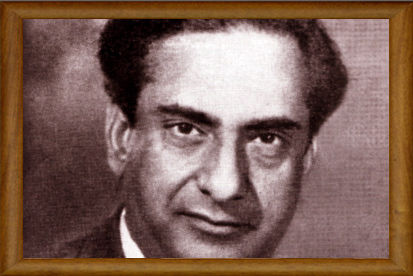Master Ghulam Haider was born in Hyderabad, Sind, in 1908 and after a few years of indifferent schooling, decided to try his hands at dentistry. Meanwhile, he started taking lessons in music from Babu Ganesh Laal. In five years, he gave up the dentist's profession and joined the Alfred Threatrical Company and then Alexander Threatrical Co., in Calcutta as a harmonium player. In 1932, the year Haider joined Playart Photophone, A. R. Kardar gave him an oppourtunity to compose music for his film Swarg Ki Seerhi made in Lahore. Unfortunately, the film could not do well at box office. Then D.M. Pancholi asked him to write the musical score for his Punjabi venture Gul-e-Bakawali (1939) which was an instant hit. 'Baby' Noorjahan's songs 'Shala Jawaniyan Mane..' and 'Pinjra De Vich Qaid Jawani..' were soon on the lips of every Punjabi film fan. But Ghulam Haider's glorious hour was still to come.
His biggest hit came the following year with Khazanchi (1941). The music of Khazanchi caused a revolution. By then Music Directors of the 1930's, who had embellished films with their exquisite compositions set in classical ragas, were beginning to sound commonplace. Khazanchi's refreshingly free wheeling music not only took the audiences by storm but also made other music directors sit up and take notice. Combining popular ragas with the rich verve and rhythm of Punjabi music, Haidar ensured that the Indian film song would never be the same again.
Ghulam Haider's association with Pancholi was to last until 1944 - a period during which he scored scintillating music for Choudhary (Punjabi 1941), Khandan (1942), Zamindar (1942) and Poonji (1943). He moved to Bombay where he worked in films like Chal Chal re Naujawaan (1944), Phool (1944), Humayun (1945), Bairam Khan (1946) and Shama (1946). The soundtrack of Shama was noticable for a dextrous use of tabla in such songs as 'Gori Chali Piya Ke Des..', 'Ham Gharibon Ka Bhi Poora Kabhi Armaan Kar De..' and 'Ik Tera Sahara..'. As Naushad put it, the tabla "spoke the words". His best-known compositions were sung by
Shamshad Begum and invoke Punjabi folk and extensively featured percussion instruments like the dholak.
While in Bombay, Ghulam Haider also composed music for
Bombay Talkies' Majboor, featuring
Lata's 'Dil Mera Toda..', Wali Saheb's Padmini, Diwan Pictures' Barsaat Ki Ek Raat, Pancholi's Patjhad and Filmistaan's Shaheed, all made in 1948. It was Haider who gave
Lata Mangeshkar her first major break in Hindi films with Majboor (1948) and took her to S. Mukherjee to sing in Shaheed (1948) but Mukherjee rejected her saying her voice was too thin! Haider warned him that this 'poor little thing' would soon put every other singer in the shade including Noorjehan! Other singers he introduced were
Sudha Malhotra and Surinder Kaur. Shaheed and Kaneez (1949) were among his last big hits in India. In the former, as patriotic songs go who can forget Watan ki Raah Mein Watan ke Naujawan Shaheed ho? The song was used twice in the film, the first at a brisk tempo to raise the moral of the revolutionaries and the second slowly and solemnly as the revolutionary's dead body is carried to the cremation ground.
Following the explosion of an ammunition laden ship in the Bombay docks towards the end of the second world war, and the mass exodus of its citizen from the city, Ghulam Haider's musicians migrated to Lahore. In vain, did Haider plead with them to stay on: he offered them two months' salary in advance and a secure shelter. But they refused and bid them a tearful farewell. Later Ghulam Haider himself left for Lahore and floated his own concern 'Filmsaz', in partnership with Nazir Ajmeri and actor S Gul. Their maiden production Gulnar was released early in November, 1953, and a few days after, the great composer himself passed away. His funeral on November 10 was attended by prominent people from all branches of fim trade. The news of his death cast a gloom over Bombay. The Cine Musicians' Association called a special meeting to mourn his death.
But today, except for the occasional playing of his songs from Shaheed over Vividh Bharti, Ghulam Haider's name is almost forgotten now. A genius is dead - what remains is the work of others influenced by him.

